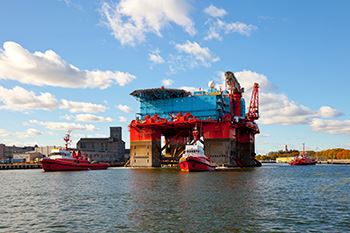
What is the Outer Continental Shelf Lands Act?
If you work on an offshore platform, oil rig and other fixed structure, you may already know a co-worker who has recovered benefits under the Outer Continental Shelf Lands Act (OCSLA). The OCSLA was passed by U.S. Congress in 1953 in an effort to extend the Longshore Harbor and Worker’s Compensation Act (LHWCA) to maritime employees working on the Outer Continental Shelf. Under section 1331(a) of the OCSLA, the “Outer Continental Shelf” is defined as “all submerged lands lying seaward and outside of the area of lands beneath navigable waters . . . and of which the subsoil and seabed appertain to the United States and are subject to its jurisdiction and control.”
Longshoremen, harbor workers and individuals working on oil rigs and platforms, dock men, ship builders and ship repairers are typically the types of employees who are eligible to collect compensation and benefits under the OCSLA. While the OCSLA is meant to be an extension of the LHWCA, there are many legal nuances under the Act that can make it very difficult to determine whether your case actually falls within the Act’s protections. If you have been involved in an accident on the Outer Continental Shelf it is in your best interest to speak with an offshore injury attorney who can properly analyze your accident to determine which laws will govern your claim.
What Benefits are Available Under the OCSLA?
The compensation and benefits provided under OCSLA are similar to benefits offered under state worker’s compensation programs. These benefits are provided to the worker regardless of who was at fault for the accident and include:
- Disability Benefits. If your accident is covered under the OCSLA you will be entitled to collect disability payments. The amount and longevity of the payments will depend upon the severity of your injuries and whether the injuries are temporary or permanent in nature.
- Medical Coverage. Under the OCSLA workers are entitled to receive compensation for the medical care necessary to recover from their injuries. Similar to Jones Act and LHWCA claims, you do not have to see the company’s doctor. You are permitted to select your own doctor for your medical care.
- Death Benefits. When a worker is killed, the surviving spouse and children will receive death benefits. If the worker was not married and did not have any children, benefits will be paid to another eligible survivor.
- Rehabilitation/Retraining Benefits. If you are injured and unable to return to your job, you will be able to seek vocational rehabilitation and retraining benefits through the U.S. Department of Labor.
How Long Do I Have to File My OCSLA Claim?
If you are thinking about filing a claim under the OCSLA, it is important know understand the statute of limitations (or legal time limit) for your claim. When a worker is injured in an accident on the Outer Continental Shelf, the claim will be governed by the statute of limitations of the “closest adjacent state.”
For example, if Louisiana is the closest state, you only have one year to file your claim because Louisiana has a one year statute of limitations. If Texas is the nearest adjacent state, you will have two years to file your claim. The laws can be confusing, so it is best to speak with an injury lawyer who can preserve your legal rights and help you recover the full OCSLA benefits you are legally entitled to receive. In OCSLA cases like all other maritime injury cases, time is of the essence and filing deadlines must be timely followed in order to preserve your cause of action.
Contact Us for Answers to Your OCSLA Questions
For more than 40 years, Willis Law Firm has been helping workers who have been injured in offshore platform and oil rig accidents. If you have questions about an offshore injury or maritime claim, Attorney David Willis can help you get the answers you need. Our legal team provides straightforward information and advice when you need it most. Contact our firm 24/7/365 by calling 1-800-468-4878. Your case is important to us and your initial consultation is always free and completely confidential.



